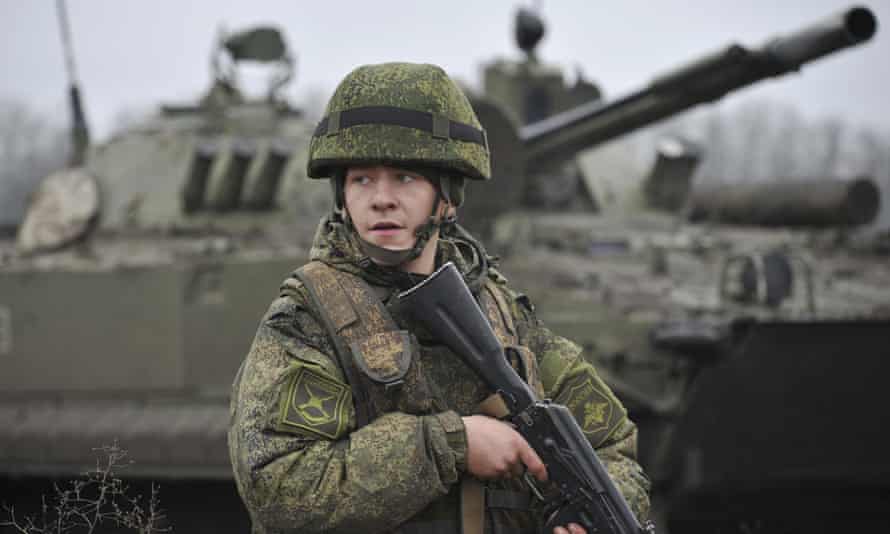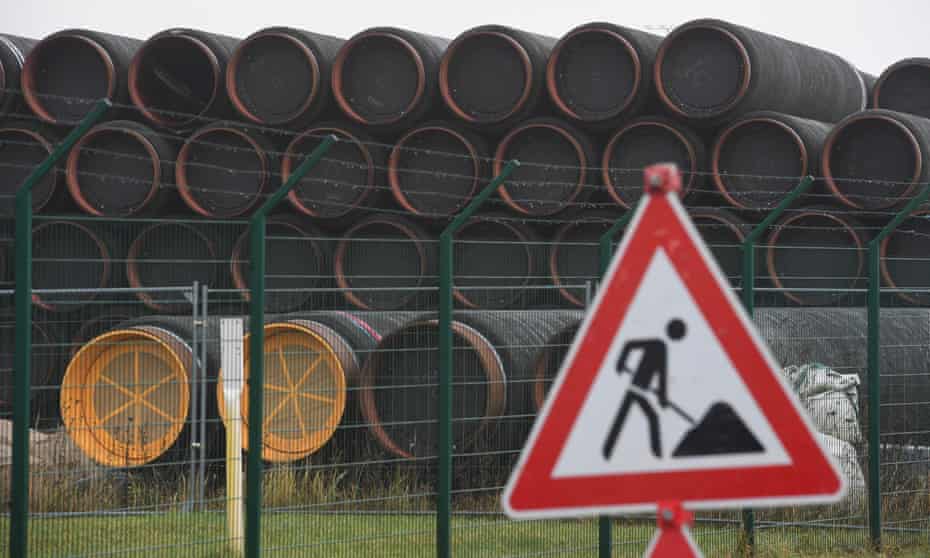Vladimir Putin's Ongoing Hardball Power Plays
Vladimir Putin's Ongoing Power Plays
"Everything is under a lot of stress and a lot of pressure.""That is why we are seeing these astronomical gas prices."Nathan Piper, head of oil and gas, Investec"Whether they are doing it to put pressure on Europe, or simply because it is commercially advantageous, is still not clear.""They now appear to be deliberately withholding volumes to the European spot market."Dr.Jack Sharples, Oxford Institute for Energy Studies
 |
| A Russian soldier takes part in drills at the Kadamovskiy firing range in the Rostov region in southern Russia. Russian troop concentration near Ukraine has raised concerns of a possible invasion. Photograph: AP |
In
2019 Russia's Gazprom saw a record year in sales to Europe. The
following year demand crashed when the pandemic shut down countries,
until the rebound of 2021 as economies began reopening. For whatever
reason that European governments and industry experts can only speculate
on, Russian supplies failed to bounce back when the economies began
refreshing.
The
mystery is why exactly more gas is not forthcoming from Russia.
Russia's state energy giant, Gazprom, has been fulfilling its
contractual obligations to the letter, but has failed to respond as one
might suppose a business anxious to make gains, normally would. On the
other hand, this could conceivably be a game that Moscow has played
before during energy-starved European winters when the Kremlin saw fit
to innocently hold back gas supplies.
The
supply crunch in Europe is building to crisis proportions. Demand for
Russian natural gas and liquefied natural gas in Asia rose when an
extremely cold season late last year extending to early 2021 along with
an unexpectedly low renewable sources performance had Europe turning
expectantly to Russia.
Europe
was left with depleted reserves when demand saw prices pushed higher
and European energy companies decided to place less into storage. Poor
wind power performance in 2021 and nuclear power plants in Germany and
France closing down forced energy suppliers to focus their reliance
increasingly on gas. This winter sees all of these conditions come to a
head.
 |
| CF Industries fertilizer manufacturing complex, forced to shut down due to high natural gas prices in Ince, U.K. Photographer Anthony Devlin/Bloomberg |
Russia
is thought to be in possession of spare production capacity, with
investors on the European spot market waiting for signs Russia may
decide to open the taps. But the amount that Russia is prepared to sell
on the European spot market has plunged. In response to which a Gazprom
spokesman said the company "supplies gas in accordance with the customers' requests in full compliance with the current contractual obligations". Full stop.
Leaving
Dr.Sharples and his team to speculate that Russia, like Europe, was
struggling to replenish storage levels on the vague supposition that
enough gas to go around was simply not there. That was relegated to the
wastebasket of hope once Gazprom announced it had no need to continue
topping up its facilities after November 8. And so, the plot thickens.
Leaving
some experts to suggest a geopolitical pressure tactic by Vladimir
Putin since gas flows across the Ukrainian border also appear heavily
down. Pressure by Moscow for EU regulators to approve the Nord Stream 2
pipeline to Germany, where Western leaders foresee Russia diverting
flows away from Ukraine at the very time Putin is amassing troops at the
border.
The
potential exists for Gazprom testing European patience to the point of
backfiring. Investment could be driven to alternative sources of energy
and in the process break Europe of its gas addiction. In the meanwhile
European power prices hit a new record while France faces a winter
supply shortage of huge proportions. Its heavy industries forced to curb
production across the region.
Electricity
delivery for the coming year leaped to an all-time high for both
Germany and France, two of the largest economies in the European Union.
France will no longer think of exporting power to other countries,
facing outages at nuclear plants, and needing all the energy it can
source for itself. France, in the face of this severe situation is
forcing factories to cut output or altogether shutter.
"If we have a very, very cold day, it could be problematic, especially if we have to import and our neighbours have problems, as well.""This is the domino effect we need to fear. But electricity will be expensive, there's going to be a cost to pay."Anne-Sophie Corbeau, research scholar, Center on Global Energy Policy, Columbia University, Paris
And in Germany, power for next year leaped in megawatt-hour cost after a 25 percent rally. "The
strength in the French market has been the main engine -- aside from
gas prices -- of strength in neighbouring markets, including Germany, in
recent days", commented the head of European power analysis at S&P Global Platts.
 |
| Tubes for the construction of the Nord Stream 2 pipeline are piled on the Baltic Sea island of Ruegen in north-eastern Germany in December 2019. Photograph: Stefan Sauer/DPA/AFP/Getty Images |
Labels: Energy Wars, European Union, France, Gazprom, Germany, Russia, Ukraine

<< Home